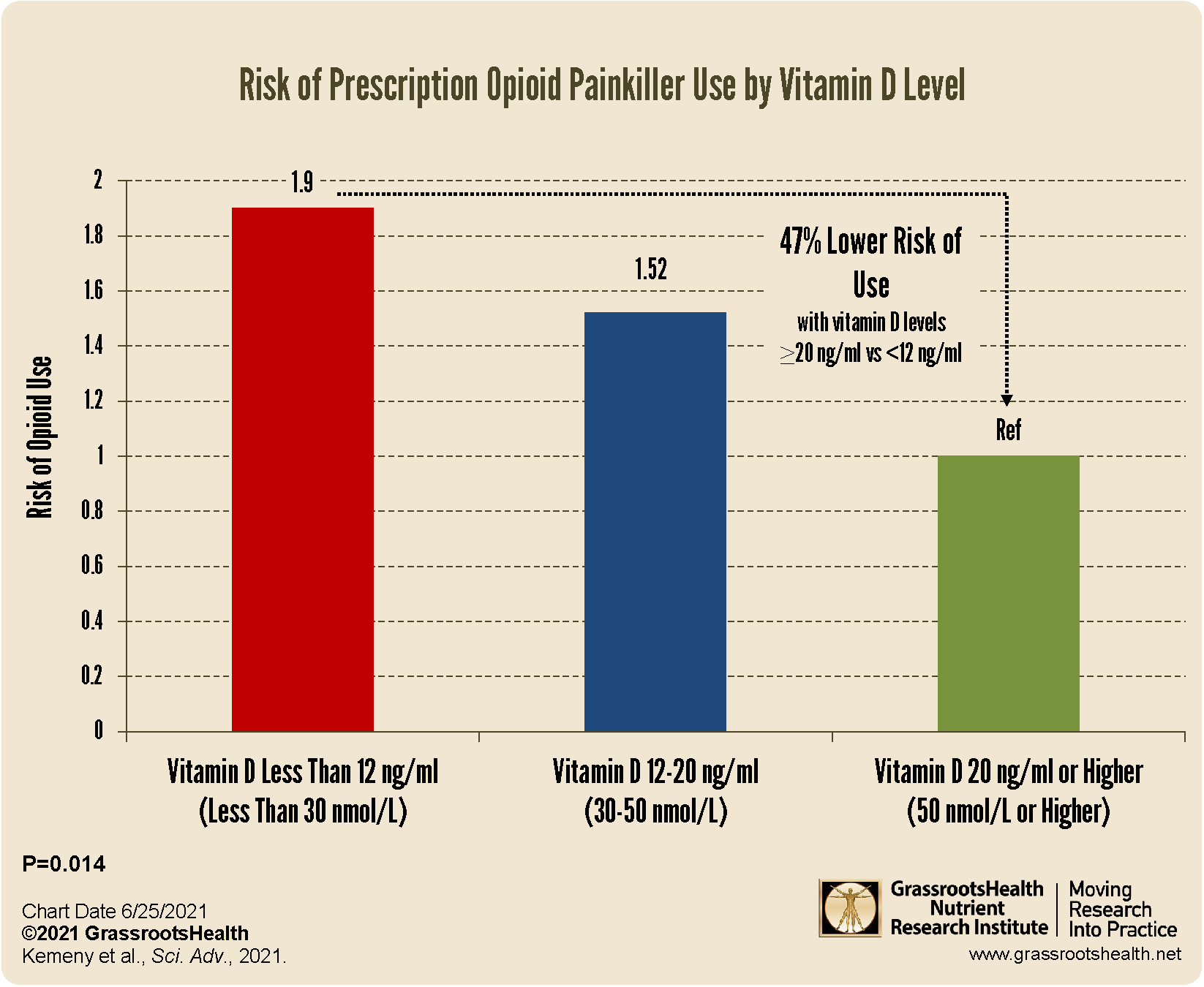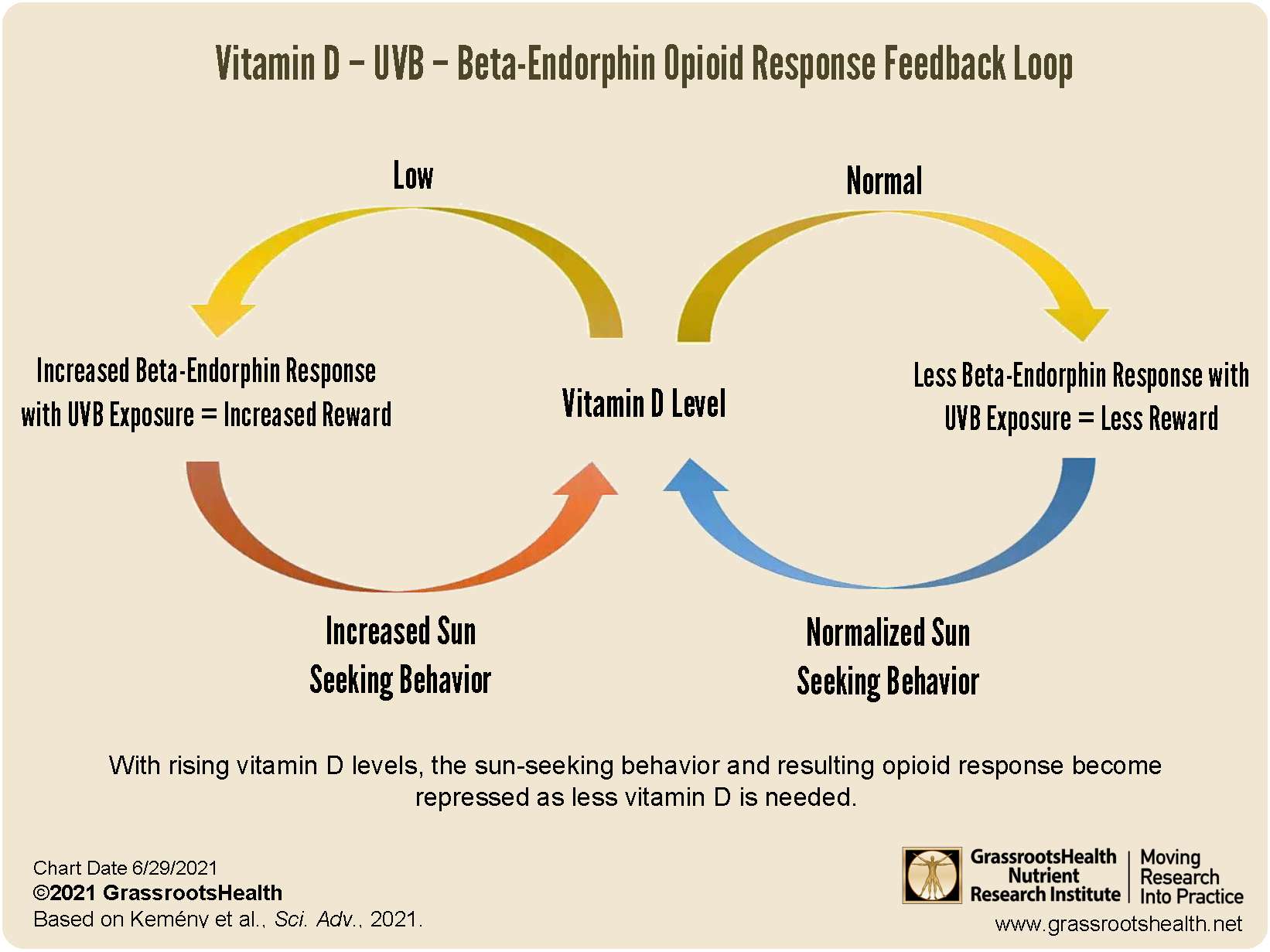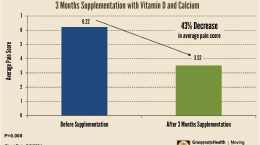Published on June 30, 2021
Study shows how low vitamin D levels can lead to increased risk of Opioid Use and Addiction
 In addition to producing vitamin D, sunlight or UVB exposure results in the release of beta-endorphins, which are naturally occurring opioids that promote mood enhancement, relaxation, and pain relief. Recent research has identified an “endogenous opioid-mediated addiction-like pathway,” or a built-in feedback loop between vitamin D levels and sun seeking behavior, triggered by the UV-induced release of beta-endorphins. The suggested benefit is to provide a “reward” for UV-induced vitamin D synthesis when vitamin D levels are low, during which time a greater amount of beta-endorphins are released upon exposure to UVB. As vitamin D levels rise, the sun-seeking behavior and resulting opioid response become repressed as less vitamin D is needed.
In addition to producing vitamin D, sunlight or UVB exposure results in the release of beta-endorphins, which are naturally occurring opioids that promote mood enhancement, relaxation, and pain relief. Recent research has identified an “endogenous opioid-mediated addiction-like pathway,” or a built-in feedback loop between vitamin D levels and sun seeking behavior, triggered by the UV-induced release of beta-endorphins. The suggested benefit is to provide a “reward” for UV-induced vitamin D synthesis when vitamin D levels are low, during which time a greater amount of beta-endorphins are released upon exposure to UVB. As vitamin D levels rise, the sun-seeking behavior and resulting opioid response become repressed as less vitamin D is needed.
Opioid Addiction in the United States
Opioid drugs, which include heroin and prescriptions such as hydrocodone (Vicodin), oxycodone (OxyContin), and morphine, are all chemically similar with similar physiological effects as the natural opioids produced by the body. While the intended use of these prescription drugs is as a pain reliever, this class of drugs also produces a high, leading to increased risk of addiction and misuse. According to the National Survey on Drug Use and Health in 2019, 10.1 million people in the United States, 12 years of age or older, misused opioids in the previous year, with 9.7 million of those involving prescription pain killers. These numbers have risen over the most recent couple of years during the COVID-19 pandemic making it increasingly important to identify avoidable risk factors for opioid dependence and abuse.
Dose-Dependent Relationship Found Between Opioid Use and Vitamin D Levels
Compared to what happens when the skin is exposed to UVB and both beta-endorphins (the endogenous opioids made in the body) and vitamin D are produced simultaneously, intake of opioid drugs bypasses vitamin D production and the proposed feedback-control loop that is managed by vitamin D levels – which is hypothesized to contribute to continued opioid seeking behavior and resulting addiction. Previous associations have been seen between vitamin D and pain levels, as well as vitamin D deficiency and increased opioid intake.
In order to further evaluate vitamin D deficiency as a contributing factor to opioid addiction, a study by Kemeny et al. used data from the National Health and Nutrition Examination Survey (NHANES, 2003-2004) to group individuals by vitamin D level and compare vitamin D levels to opioid use. They found an inverse, dose-dependent association between vitamin D levels and self-reported opioid use, independent of pain. The chart below shows the decreased frequency of opioid use among individuals with higher vitamin D levels, showing a 47% lower risk of opioid use among those with a vitamin D level of 20 ng/ml (50 nmol/L) or higher compared to those with levels below 12 ng/ml (30 nmol/L).
Another analysis looked at the risk of Opioid Use Disorder (OUD) and how it was related to the presence or history of vitamin D deficiency. This time, the authors used data from 163,531 primary care patients, among which 2772 OUD cases were identified and matched to 8265 controls. They found that patients with OUD were much more likely to have vitamin D insufficiency or deficiency (levels below 20 ng/ml or 50 nmol/L), where 28% of OUD cases had a most recent vitamin D level below 20 ng/ml, versus only 17% of controls (P<0.001). OUD cases were also less likely to have a vitamin D level of at least 30 ng/ml (75 nmol/L) and were more likely to have had vitamin D deficiency compared to controls.
How Could Vitamin D Deficiency Increase Opioid Use?
To answer several hypotheses as to how and why vitamin D levels may influence opioid addiction, the authors ran several experiments using mouse models. In doing so, they discovered the following:
- vitamin D deficiency increased sensitivity to morphine reward, and the opioid-seeking behavior was reversed with vitamin D supplementation
- vitamin D signaling seemed to regulate the perception of pain and opioid analgesia
- vitamin D deficiency led to faster tolerance to morphine and exacerbated opioid dependence, which was alleviated by correcting vitamin D levels
- vitamin D signaling plays a complex role in reward behaviors
- vitamin D deficiency seems to modulate opioid responses in multiple areas of the brain
- vitamin D deficiency increased UV radiation-induced endogenous pain relief and reward
- vitamin D deficiency did increase the UV/opioid reward, likely to maximize vitamin D synthesis, which normalized with the correction of vitamin D levels
In Summary
Overall, the results from the above imply that vitamin D deficiency may
- increase risk of developing tolerance to opioid drugs and opioid dependence
- increase risk of more significant withdrawal symptoms
- experience greater reward from opioid exposure
In conclusion, based on their findings, the authors state
“The inverse dose-response relationship between VitD levels and likelihood of opioid use, coupled with our preclinical data, is consistent with a model in which even modest rescue of VitD deficiency could be beneficial in the prevention and treatment of opioid addiction, especially considering that VitD is generally inexpensive, accessible, and safe.”
Measure Your Level of Vitamin D Today!
 Having and maintaining healthy vitamin D levels and other nutrient levels can help improve your health now and for your future. Choose which to measure, such as your vitamin D, omega-3s, and essential minerals including magnesium and zinc, by creating your custom home test kit today. Take steps to improve the status of each of these measurements to benefit your overall health. You can also track your own intakes, symptoms and results to see what works best for YOU.
Having and maintaining healthy vitamin D levels and other nutrient levels can help improve your health now and for your future. Choose which to measure, such as your vitamin D, omega-3s, and essential minerals including magnesium and zinc, by creating your custom home test kit today. Take steps to improve the status of each of these measurements to benefit your overall health. You can also track your own intakes, symptoms and results to see what works best for YOU.
Enroll and test your levels today, learn what steps to take to improve your status of vitamin D (see below) and other nutrients and blood markers, and take action! By enrolling in the GrassrootsHealth projects, you are not only contributing valuable information to everyone, you are also gaining knowledge about how you could improve your own health through measuring and tracking your nutrient status, and educating yourself on how to improve it.







